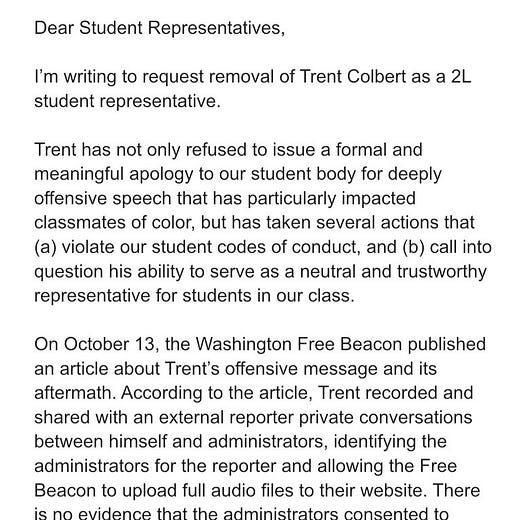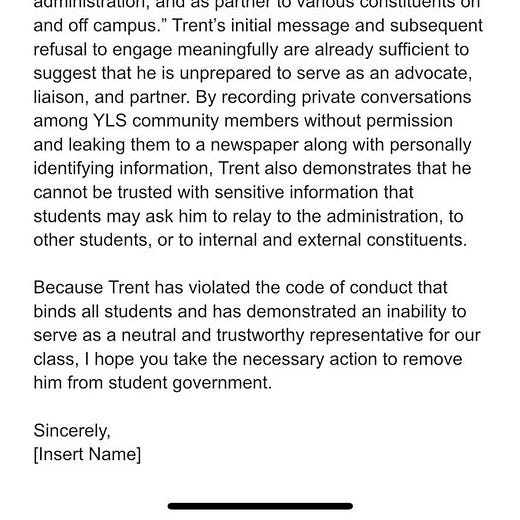E-Pluribus | October 15, 2021
How to win the Gender Wars, the Trojan Horse of 'social and emotional learning,' and cancel culture and kids' mental health.
A round up of the latest and best writing and musings on the rise of illiberalism in the public discourse:
Abigail Shrier: We Must Win the Gender War
Abigail Shrier’s book Irreversible Damage: Teenage Girls and the Transgender Craze has been the target of censorship since its publication despite Shrier’s general support of and sympathy regarding transgenderism. Shrier makes the case at her Substack that conservatives have often shot themselves in the foot by focusing on what amount to distractions instead of zeroing in on the foundational issue: the rights of parents to raise and care for their own children.
[W]hile conservatives pounded lecterns over school bathrooms, they lost five winnable battles to a radical and unpopular ideology. They painted themselves once again into American Gothic, which might have made them sympathetic, had they not hired the portrait artist and grasped for a pitchfork.
[…]
Conservatives might have said: Here is one more distraught American teenager, handed dangerous drugs in place of a solution. The long-term risks of testosterone to a woman’s body include infertility, sexual dysfunction, a cardiac event, endometrial cancer, vaginal and uterine atrophy, and, yes, frequent urinary tract infections. Republicans might have gone after Grimm’s reckless doctors and an activist medical system that has all but abandoned its Hippocratic oath when it comes to gender medicine.
Conservatives might have trained their sights on social media, which spreads self-harm like a flu, and the Big Tech firms that push this harmful drug on other people’s children. They might have opposed the schools that peddle gender confusion to preschoolers and help middle school children “transition” in secret. They might have fought those laws in several states that allow minors to begin transitioning treatment without parental consent. They are, at last, confronting the mass experiment on children in the form of puberty blockers, which place bone density, brain development, and sexual function at risk, and, for good measure, jeopardize fertility. Doctors who took a Hippocratic oath and promised only to heal began removing healthy breasts of girls as young as 13.
Here, then, is what winning might look like. Conservatives ought to spend the next decade championing one of the most aggrieved constituencies: America’s parents. We might fight for decent, evidence-based medicine or responsible therapeutic practices. We ought to show compassion for those children with gender dysphoria while taking note that the activists are exploiting them to advance a cynical, dangerous agenda. We ought to oppose gender ideology in the schools, which is both harmful and broadly unpopular. We ought to defend the rights of women and girls where they are threatened because an America that is no longer safe or fair for them is hardly worth saving at all.
Read it all.
John D. Sailer: Equity in Disguise
On the surface, “social and emotional learning” (SEL) might sound difficult to object to. As John Sailer spells out at City Journal, however, SEL has been employed as “a lever for equity” and focused more on the substance of what is being taught (social justice) rather than focused on the ability of the students to effectively learn.
The substance of social and emotional learning has undergone a subtle but important shift. CASEL deems equity a key fixture of its strategic plan, hosted seminars discussing “SEL as a lever for equity,” and touted a social-justice-oriented model called Transformative SEL. That model, in the organization’s words, “concentrates SEL practice on transforming inequitable settings and systems” and seeks to promote “justice-oriented civic engagement.” How? By “making explicit” such issues as “power, privilege, prejudice, discrimination, social justice, empowerment, and self-determination.”
In practice, Transformative SEL resembles most other equity-driven pedagogies. CASEL recently released a list of “Guiding Questions” for teachers to evaluate SEL practice “through an equity lens.” They include: “In what ways does your identity . . . inform who you are as an educator?” “In what ways have you taken action to impact change when you recognize inequity in your school?” “How do historic and systemic issues of inequity contribute to your understanding of the root causes of the problems you see?” Witness the concept creep: teaching relationship skills and self-management now requires understanding and redressing “historic inequities.”
Students can expect a politicized education focused on race, identity politics, and activism. Another CASEL brief, issued last spring, describes strategies for implementing Transformative SEL in the classroom. One involves “Using SEL Discussions to Validate Student Experiences of Oppression.” Another: “SEL Instruction as a Space to Encourage Youth to Use their Voice for Social Justice.”
If CASEL deploys charged language to advocate substantive political goals, schools are following its lead. SEL is already ubiquitous in American schools, and 20 school districts have partnered directly with CASEL in their SEL implementation—including such major metropolitan districts as Chicago and Boston Public Schools. According to Melissa Schlinger, vice president of practice and programming at CASEL, the partner districts “have really taken [the Transformative] approach to their SEL work.”
Read it all here.
Erica Komisar: Cancel Culture’s Mental-Health Toll
Much attention has been given to recent reports of the potential harm to which social media can subject young people. At the Wall Street Journal, therapist Erica Komisar reports that an online cancel culture attack or shaming can also have serious consequences on a teen’s mental health.
As a therapist, I see many young people who are deeply perfectionistic and worried about their image, both online and in person. Because social media is everywhere, adolescents are constantly in a state of high alert about any criticism or rejection, and online communities amplify this beyond what some are biologically capable of handling.
Cancel culture makes the problem much worse. One of my patients told me a story about her daughter, a college student, who made a tasteless racial joke at a friend’s expense. She instantly regretted it, and the friend soon forgave her. But another student overheard the joke and reported my patient’s daughter to the dean, who removed her from a student-leadership position and told her she’d be expelled if she told another bad joke.
It got worse. The eavesdropping student posted about the joke on social media, and other students bullied my patient’s daughter online so severely that she ended up in the emergency room with a panic attack. None of this brutish treatment was necessary for her to learn the lesson of her mistake.
School-sanctioned shaming and a social media free-for-all of bullying leave teens and young adults constantly walking on eggshells, afraid to express heterodox opinions in class, among peers or in schoolwork. Making mistakes and learning from them is an important part of young people’s development. It’s how they grow to accept themselves as well as others—if peers and people in authority show them empathy, tolerance, patience and kindness. Terrorizing young people is no way to teach them sensitivity and respect.
Read the whole thing.
Around Twitter
The latest on the Yale Law School flap over a student’s email invitation to a party, via David Lat:
The latest in a series from Peter Boghossian defining woke buzzwords:
Andrew Sullivan thinks Netflix’s defense of Dave Chappelle could strike a blow against the recent tide of censorship:
And finally, perhaps there should be a limit on “gotta hear both sides”:












